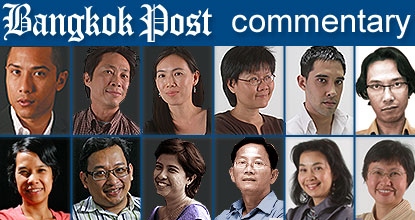
Since the launching of the rice-pawning scheme a few months ago ("pawning" is not only a correct translation of the Thai word jam nam but also reflects the sense of the scheme better than the "pledging" that many writers have used), two areas have been analysed most thoroughly: its potential impact on the budget and national debt, resulting from the large losses that will occur, and the corruption that is due to happen at various steps of the scheme. Some analysts go so far as to say that losses from this scheme will bankrupt the country and pawning rice is tantamount to pawning the country.
Losses have not been realised so far as the millions of tonnes of pawned rice now sitting in various silos and warehouses across the country have yet to be sold. The potential losses remain huge, however, as prices of rice in the world markets remain substantially lower than the price paid by the government at 15,000 baht per tonne of paddy. Some members of the cabinet themselves have openly admitted that corruption is likely to take place and investigations are already ongoing, partly as a result of the details emerging from last week's parliamentary debate.
Other aspects of this scheme have received less attention from analysts; three in particular have been neglected.
First, rice farmers will take on increased risks by trying to grow more rice. This is already happening. Farmers have started planting another rice crop on land that is not irrigated or partially irrigated and normally would lie fallow or planted with crops that demand less water during the dry season. They know that the rice plants may wither for lack of water before producing the grain; but some do not feel that they are taking a risk, for they are confident that if that actually happens, they could get together and pressure the government to compensate them for their losses. A major fertiliser dealer believes that some farmers apparently wish to get compensation for such losses more than they wish to harvest the rice. This belief is based on the fact that fertiliser sales have been flat at best, despite the increased areas planted with rice.
There are also other risks if the government continues to pay for pawned rice at a much higher price than on the world markets. As farmers switch from mixed cropping to rice only, the risk of crop diseases goes up. Farmers also become more vulnerable as they depend solely on one cash crop while producing less of other things for home consumption. This is contrary to the policy of promoting mixed farming _ an important aspect of the sufficiency economy philosophy that the government has repeatedly said it is employing.
Second, the government will become a de facto rice monopoly as its willingness to pay for rice at a much higher price than the private sector will drive out traders who have long been playing a crucial role in the rice sector. A monopoly has its well-known shortcomings, which would be further elevated by any inefficiency and corruption in the government. In this regard, there is something to be learned from what happened in the Philippines when the corrupt government under the leadership of Ferdinand Marcos took over coconut trading. Coconuts are planted by small farmers all over Philippines, not unlike rice farming in Thailand. Suffice to say that the Marcos regime's takeover of coconut trading was one of the major factors that made the Philippines the sick man of Asia for quite some time.
Third, this populist policy will serve to expand and strengthen the loyalty of rural Thais, especially the rice farmers of the poorer Northeast, to the politicians who launched populist policies in this country in 2001. These politicians are largely associated with the disbanded Thai Rak Thai Party and form the core of the present government. Such loyalty has been exploited in various ways besides providing votes during the elections, including supplying demonstrators for street protests in 2010 and the occupation of a major shopping neighbourhood in Bangkok that ended in riots and arson.
Rice farmers will not only form a reliable base of support for corrupt politicians the way unionised workers did for Juan Peron of Argentina, but are also likely be employed as part of semi-paramilitary troops for protecting the politicians as well as for harassing opponents. A glimpse of this can be seen by the red shirts trying to interrupt every political rally staged recently by the main opposition party.
This tactic is similar to how Adolf Hitler and Benito Mussolini employed the Brown Shirts and the Black Shirts, respectively.
Add all of the above up and a disaster would seem to be looming.
Sawai Boonma has worked as a development economist for more than two decades. He can be reached at sboonma@msn.com
